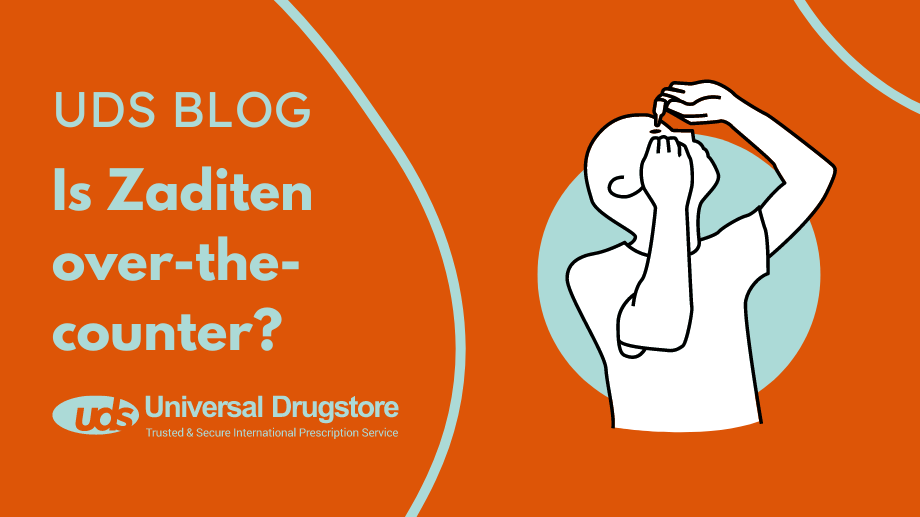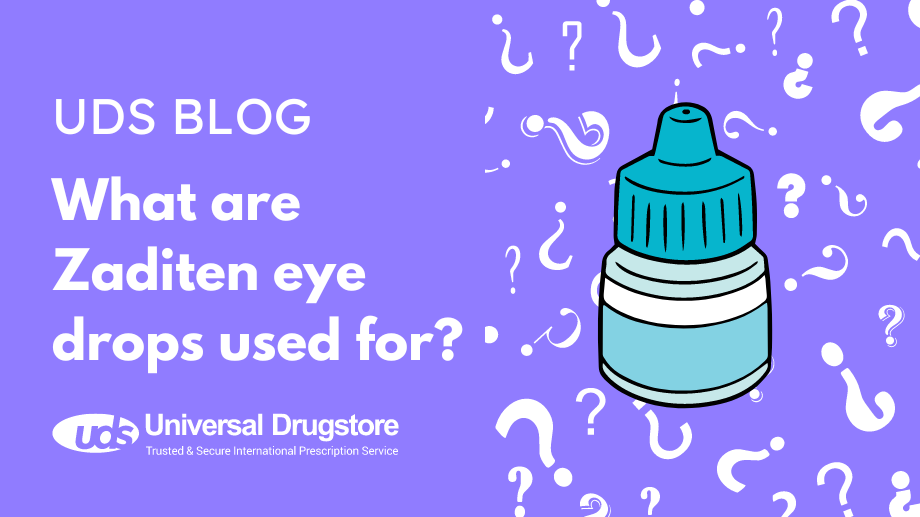Is Zaditen over the counter?

Zaditen (ketotifen) is a brand-name antihistamine and mast cell stabilizer that is manufactured by Novartis Pharmaceuticals. It is available in various dosage forms, including eye drops, tablets, and syrup. Zaditen tablets and syrup are prescribed as treatment outside of the United States and there is no FDA approval for this usage. In Canada, Europe, New Zealand, and Mexico, however, oral Zaditen is commonly prescribed. Zaditen eye drops are over-the-counter (OTC) so you do not need a prescription for them. Ketotifen is available in the US under the brand names Zaditor and Alaway. They also come in generic versions that are readily available at most pharmacies.
Zaditen is commonly used to relieve symptoms associated with allergic conditions, such as seasonal allergic conjunctivitis (watery, itchy eyes) and allergic rhinitis (runny or stuffy nose). Oral Zaditen is also used to help prevent asthma attacks.
Keep reading as we go into more detail about Zaditen and answer some frequently asked questions.
Zaditen FAQs
What is Zaditen used for?
Zaditen eye drops, whose active ingredient is ketotifen hydrogen fumarate, is an anti-allergic antihistamine used for the short-term treatment of seasonal allergic conjunctivitis (itchy, watery eyes) in adults and children 3 years of age or older. Zaditen tablets and syrup contain the same active ingredient and are used to treat and prevent allergy symptoms such as stuffy or runny nose and itchy, watery eyes. It is also used to prevent bronchial asthma. They should not be used to treat an asthma attack that is already occurring.
What are the side effects are possible with Zaditen?
The most common side effects of Zaditen seen in clinical trials when compared to placebo include:
- Eye irritation (eye drops)
- Eye pain (eye drops)
- Somnolence (drowsiness)
Other possible side effects of Zaditen include:
- Dry mouth
- Headache
- Weight gain
- Blurred vision
- Dizziness
- Agitation
- Nervousness
- Insomnia
- Abdominal pain
Rarely, Zaditen may cause serious side effects such as:
- Serious, life-threatening allergic reactions, including anaphylaxis.
- Increased risk of seizures.
- Damage to soft contact lenses
- Impairment when driving or using machines
These are not all of the possible adverse events of Zaditen. You should always seek medical advice from a healthcare professional for any questions or concerns about your medical condition or treatment. You should also read all the drug information, including your Medication Guide that comes with Zaditen. You can report side effects to the FDA at 1-800-FDA-1088 or www.fda.gov/medwatch.
How does Zaditen work?
The active substance in Zaditen is ketotifen fumarate, which is a histamine H1-receptor antagonist and mast cell stabilizer. Blocking this receptor and stabilizing mast cells helps to reduce asthma and allergy symptoms by reducing the body’s response to allergens (substances that cause allergic reactions).
What are the warnings and precautions for Zaditen?
You should not take this medication if you have a hypersensitivity to ketotifen or any of the inactive ingredients in the formulation. Zaditen tablets contain 1 mg of ketotifen fumarate as well as inactive ingredients such as magnesium stearate, and lactose monohydrate. Zaditen eye drops contain 0.25 mg/mL of ketotifen hydrogen fumarate and inactive ingredients such as benzalkonium chloride, glycerol, and sodium hydroxide. Zaditen syrup contains 1 mg ketotifen (as hydrogen fumarate) per 5 mL and inactive ingredients such as strawberry flavoring agent, citric acid, and maltitol liquid. See the package insert for all the inactive ingredients of the Zaditen product you are prescribed.
You should be sure your healthcare provider is aware of all your medical conditions as they may be contraindications or you may need increased monitoring during treatment, including:
Shop Medications
- Epilepsy or history of seizures.
- Diabetes.
- Fructose or lactose intolerance.
- Pregnant or plan on becoming pregnant.
- Breastfeeding or plan to breastfeed.
What drug interactions are there with Zaditen?
When Zaditen is taken with other prescription drugs, over-the-counter medications, vitamins, herbal products, and supplements, it may change how they work or increase the risk of side effects. There are no interactions listed for Zaditen eye drops. However, if you are prescribed Zaditen tablets or syrup, tell your healthcare provider about all your current medications, including:
- Oral antidiabetic medications
- Sedatives
- Antihistamines
- Alcohol
How do you take Zaditen?
Your healthcare provider will determine your dose of Zaditen based on the condition being treated and which dosage form you are using.
The typical dose of Zaditen is as follows:
- Eye drop – 1 drop in the affected eye(s) twice daily (3 years and older)
- Tablets – 1 mg twice daily or 2 mg once daily
- Syrup – 0.25 mL/kg twice daily for 6 months to 3 years; 5 mL twice daily for children over 3 years
How long can you use Zaditen eye drops for allergy relief?
Zaditen eye drops can be used long-term to treat itchy, watery eyes if your healthcare provider feels it is necessary. You should continue to use this medication as suggested by your healthcare provider until pollen season is over or you are no longer exposed to the allergic substance. However, if you have used Zaditen eye drops for 2 or 3 days and your symptoms do not improve, contact your provider.
Where can I find Zaditen for sale without a prescription?
Zaditen eye drops are not available in the US but can be purchased at several online pharmacies without a prescription. Ketotifen, the active ingredient in Zaditen eye drops, is available in the US under the brand names Alaway and Zaditor. These, along with generic versions, can be found at most US pharmacies.
Zaditen tablets and Zaditen syrup require a prescription but are not approved by the FDA. They are commonly used outside of the US to treat some allergic conditions and for the prevention of asthma attacks. They can be purchased at Universal Drugstore and shipped to you with a valid prescription.
What is the generic for Zaditen?
The generic for Zaditen is ketotifen. It belongs to a group of drugs that have anti-allergic properties. Depending on the dosage form, it can be used to help prevent asthma attacks and allergic conditions such as rhinitis (stuffy or runny nose) and itchy, watery eyes.
What is the difference between Zaditen and leading OTC antihistamine eye drops?
With Zaditen (ketotifen fumarate), you can expect fast, effective relief with just one drop that lasts up to 12 hours, whereas most leading OTC antihistamine eye drops only last for up to 4-6 hours.
Related Medications
- Zaditor Eye Drops (ketotifen)
- Pataday Eye Drops (olopatadine)
- Patanol Eye Drops (olopatadine)
- Lastacaft Eye Drops (alcaftadine)




